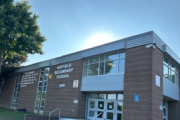In the U.S., citizens are more likely to vote as they age. With the U.S. in another presidential election year, the demographic with the highest turnout will have the most sway over results.
According to research from the Pew Foundation, voter turnout in the 2020 general election climbed to decades-high levels. More than 158.4 million people, or 62.8% of U.S. citizens aged 18 and older, cast a vote in the 2020 presidential election, Pew found.
Here’s a breakdown of how that turnout looked by age:
This illustrates a trend toward higher voting rates over time, showing that those over age 65 are the most reliable voting group.
“All potential voters undergo a cost-benefit calculation,” said Daniel Shea, professor of government at Colby College in Waterville, Maine, in an email.
Citizens calculate whether voting is worth their time and if it would make a difference. “For older Americans, the costs are lower, given they are generally more up on current events, have more time to vote and know how the voting process works,” Shea added.
Here’s a look at why senior citizens may be more inclined than younger people to cast their votes on election day.
[READ: How Much You Will Get From Social Security.]
Protecting Social Security and Medicare
Senior citizens are the recipients of popular federal government entitlements such as Social Security and Medicare and are generally the most attuned to potential changes to those programs.
Social Security and Medicare directly affect senior voters’ finances, which serves as a big motivation to vote if they believe electing one political party or the other would result in cuts.
That means older voters often perceive government as playing a significant role in their lives. Additionally, many of the Social Security and Medicare rules are esoteric, and voters who aren’t directly affected by them are unlikely to learn the nuances.
Besides wanting to protect Social Security and Medicare, from which they directly benefit, older voters may have a desire to preserve those programs for successor generations, said Atiba Ellis, a professor at the Case Western Reserve University School of Law in Cleveland, Ohio, in an email.
“Moreover, interest groups like the (AARP) and others serve to organize for the interest of senior citizens, where other age demographics don’t have interest groups that seek to motivate participation from across an entire age demographic,” Ellis said.
Not only do younger citizens not have similar groups advocating for them en masse, but their voting behaviors tend to be motivated by the significance of a particular politician rather than consistent attention to long-term policy issues, Ellis added.
[READ: The Maximum Social Security Benefit in 2024 — and How to Earn It]
Relocation and Busy Schedules Affect Voter Registration and Participation
Voters of all ages are familiar with this fact of American life: Any time you move, you’re required to update your voter registration with your new address. Younger voters who are busy with families and careers often can’t or don’t prioritize keeping their voter registrations current.
In a 2020 blog post by the University of Virginia’s Frank Batten School of Leadership and Public Policy, associate professor John Holbein wrote, “The act of voting can take considerable time, effort and planning. There are the institutional hurdles — such as voter registration and acquiring the accepted voter identification, which can vary by state.”
“Young people often have irregular school and work schedules while juggling life’s many other demands and distractions,” Holbein added.
Older voters, though, tend to move around less and have more set schedules.
“Social stability also manifests as the ability to rely on a stable job, home and income,” Ellis said. “For older citizens, they do not need to move or find new jobs, and thus re-register every time they move, so voting is easier from this perspective.”
Older voters can also face hurdles. As people feel the effects of aging, their ability to get the requisite driver’s license or identity card can become increasingly difficult, Ellis cautioned.
Greater Sense of Social Obligation to Vote
Senior citizens are often long-time residents of their communities. This means they have strong social ties and an interest in ensuring their voices are heard regarding decisions that will shape their futures.
In addition to having more time and maintaining current voter registrations, older voters are often more politically engaged, according to Kristen Coopie, director of pre-law at Duquesne University in Pittsburgh.
“Many older Americans serve as poll workers or volunteer in campaigns, and these types of engagement naturally lead to their participation in elections,” Coopie said in an email.
She noted that older voters are often targeted by political campaigns because candidates know that older voters tend to be more likely to turn out.
Americans’ attitudes toward voting may also have changed, resulting in greater turnout among older adults.
“Older citizens come from a time when voting was an event and everyone participated. Going to the polling place on election day was an opportunity to see your friends and neighbors also carrying out their civic duty,” said Patti Dubois, a member of the Committee for Safe and Secure Elections and city clerk in Waterville, Maine, in an email.
“Today’s polling places don’t have the neighborhood feel of years gone by,” she added.
“In addition, older people recognize the importance of casting their vote since many know of previous generations that may not have had that option due to their race, gender or inability to pay poll taxes,” she said.
More from U.S. News
The 10 Most Enjoyable Jobs for Older Workers
Biden and Retirement: What Has the President Done for Retirees?
If You Want to Retire in 2025, Here’s What You Need to Prep Now
Why Older Citizens Are More Likely to Vote originally appeared on usnews.com
Update 02/15/24: This story was published at an earlier date and has been updated with new information.







